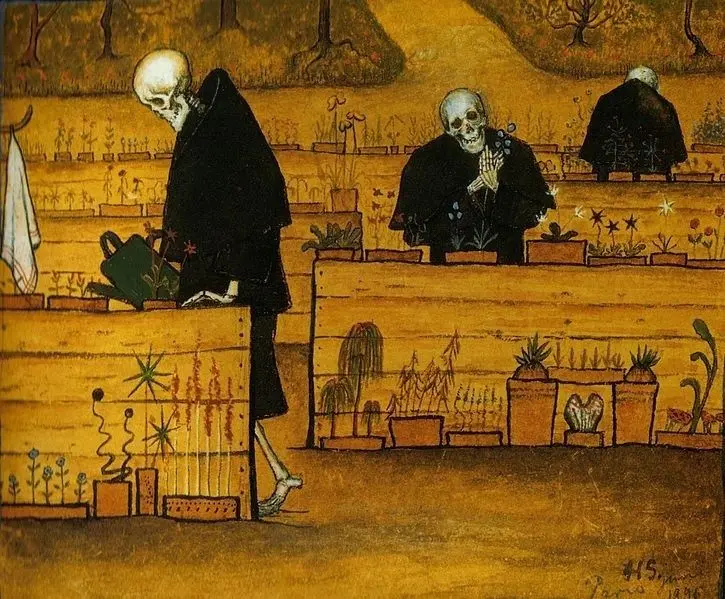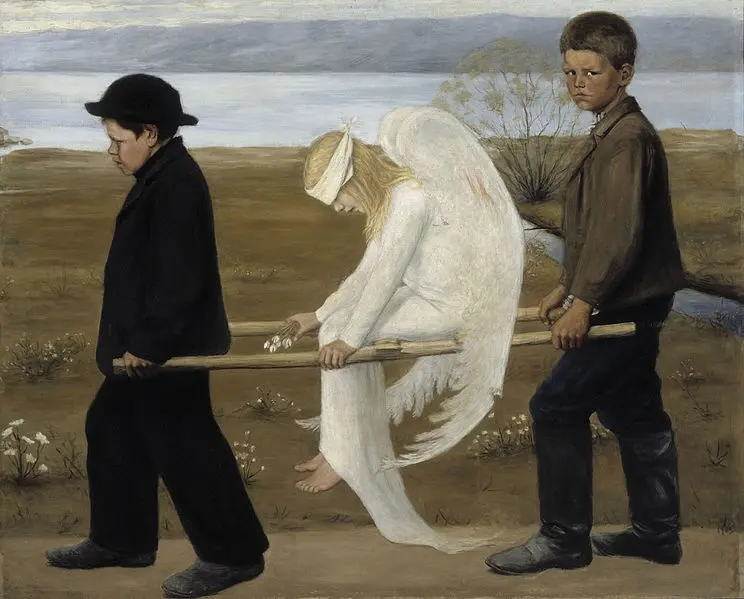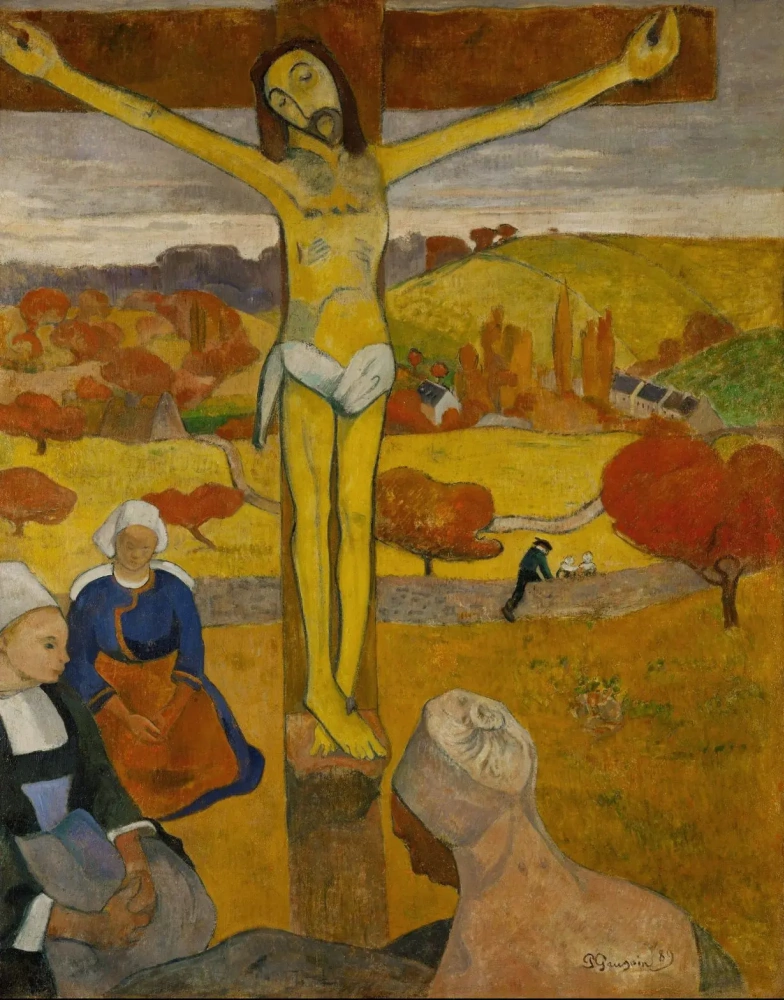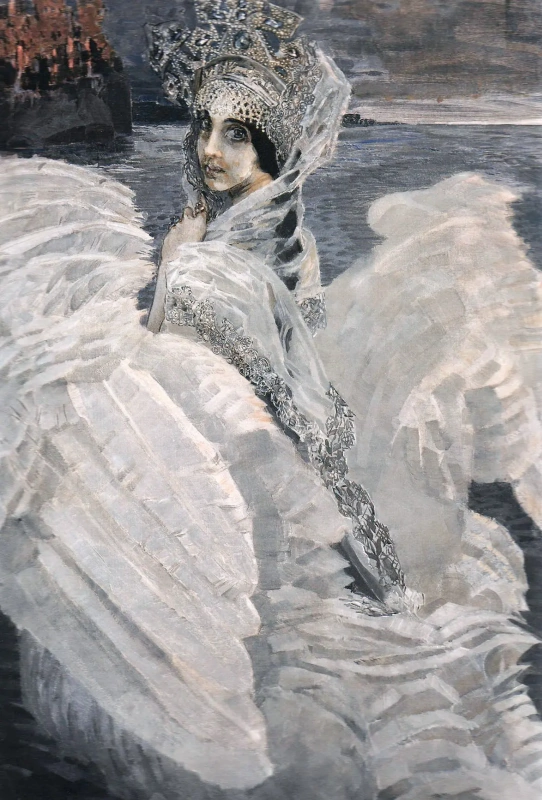
Symbolism is a paradox: it relies on an emphasis on material form (decorative patterns in painting) as the vehicle for transcending the material or empirical world. The paintings of the Symbolists are completely made of such forms that appeal to the subconscious.
Symbols, symbols, symbols...
Paul Gauguin's painting "The Yellow Christ", which is considered to be one of the key works of Symbolism in painting, shows the crucifixion of Christ as Breton women are gathered in prayer. The three women under the cross are sad but rather purely ritualistically. Besides, pay attention to Christ’s face — how quiet and pacified it is.Even today this canvas remains controversial. Gauguin broke from the traditional historical views of Christ’s crucifixion to create this symbolic piece of art. This picture is filled with symbols. The allegorical and mysterious is inherent in it. Each symbol expresses the idea to which a person comes intuitively, unconsciously. Colors and technique only supplement and emphasize the intended meaning.
Trying to understand how the peasants perceive the exceptional phenomenon of Christ, Gauguin represents him as the object of their perception — as a kind of a "yellow plant" or even a fruit of life ready to be harvested like everything around him. In the spirit of the country life, the worldview is based on observation of the cycles of nature’s "dying" and "resurrecting" according to the circulation of seasons… Nature with its incredible fertility is also a kind of goddess sacrificing herself for the sake of us. We harvest Christ’s self-sacrifice as we harvest nature’s fertility and generosity. What nature does for our body, Christ does for our soul, and for the sake of the continuation of our life as specie."
Midway between the angel and the beast, between Synthetism and Primitivism , Gauguin anticipates the importance and gravity of the great human and artistic adventure he is preparing to experience.

For example, "Wounded angel" painted by the Finnish artist Hugo Simberg, speaks to us in many ways — there are as many interpretations as there are viewers. Simberg himself declined to offer any deconstruction, suggesting that the viewers draw their own conclusions. This painting is one of the most beloved works of Finnish art and northern symbolism.
It is important not to mistake
Symbolism intersects with Art Nouveau in many ways. The principal difference is that Art Nouveau is a decorative and applied style with clear rules and features, whereas symbolism is a much broader concept. If in Art Nouveau the main thing is to see, in symbolism — to feel. It has more metaphors and allegories.Basically, this art style was formed throughout the history of mankind, because the symbols had always been there. For example, a halo on icons is a symbol of holiness, a dove is an international symbol of peace.
Symbolism is always a mystery, a desire to answer the eternal questions. As Leon Trotsky said, it is "the desire to forget yourself, to be on the other side of good and evil."
Famous paintings of Symbolist artists
— Mikhail Vrubel’s "The Swan Princess" (1900) is based on "The Tale of Tsar Sultan" opera by Rimsky-Korsakov, which was based on the fairytale of the same name by Pushkin. The part of the Swan Princess was performed by the artist’s wife, she also sit for the painting.
— Paul Gauguin’s "Yellow Christ" (1889) is considered to be one of the key works of Symbolism in painting.
— Hugo Simberg’s "Wounded angel" (1903) is one of the most beloved works of northern symbolism, and it is often used to illustrate books, posters, and designs.
You are an expert, if:
you consider Vasnetsov’s painting "Ivan Tsarevich on the Grey Wolf" rather Art nouveau art than symbolism. It is ornate, decorative, but has no symbols that everyone understands.You are a layman, if:
you do not see the difference between symbolism and surrealism . Surrealism distorts reality, there is no logic, the work of the Symbolists look quite realistic — they’re just from another, other-worldly reality. They look as if someone has opened the door between the world of dreams and everyday life.Not symbolic money
— According to various experts, the "Yellow Christ" by Paul Gauguin is estimated at USD17−25 million. The painting is kept in the Albright-Knox Art Gallery (Buffalo, New York).— Sergei Sudeikin's "Georgian cabaret, Tiflis" (1919) was sold in 2005 at Sotheby’s for almost USD300.000. Sudeikin was a member of the "Blue Rose", a union of Russian Symbolists. Their first exhibition "The Scarlet Rose" was held in 1904 in Saratov. Three years later they merged into the "Blue Rose". Choosing the name, the artists relied on the work "Blue Flower" - a symbol of an unattainable ideal, which was used by the German writer Novalis.

























